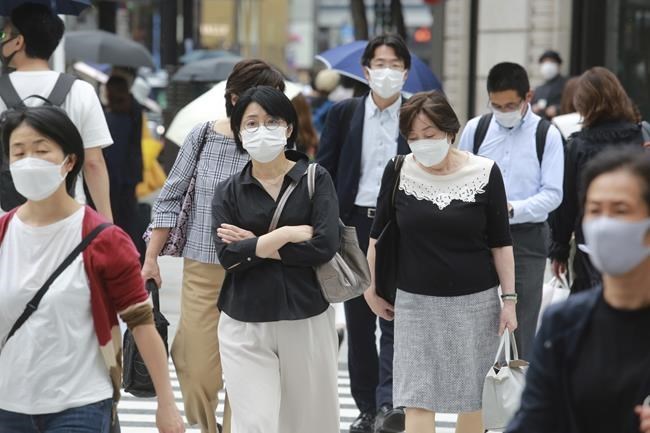TOKYO (AP) — Japan announced Thursday it is extending a coronavirus state of emergency in Tokyo and 18 other areas until the end of September as health care systems remain under severe strain, although new infections have slowed slightly.
Prime Minister Yoshihide Suga said serious cases remain high and are still overwhelming many hospitals.
The current state of emergency, which was to end on Sunday, was issued first in Okinawa in May and gradually expanded. Despite the prolonged emergency, the largely voluntary measures have become less effective as the exhausted public increasingly ignores them.
The extension will cover a period when Japan’s government is in transition. Suga has announced that he will not run in a Sept. 29 race for his party’s leadership, and his successor in that race will likely become the next prime minister.
Suga's government has faced sharp criticism over its handling of the virus.
THIS IS A BREAKING NEWS UPDATE. AP’s earlier story follows below.
TOKYO (AP) — Japan is to further extend a state of emergency in Tokyo and nearly 20 other areas until the end of September as the health care systems remain under severe strain though coronavirus infections have slowed slightly.
The current emergency, which was to end on Sunday, was issued in Okinawa in May and gradually expanded. Despite the prolonged emergency, the largely request-based measures have become less effective as the exhausted public ignores them.
The planned extension covers a period when Japan's government is in transition. Prime Minister Yoshihide Suga is not running in a Sept. 29 race for his party's leadership, and his successor likely will be the next prime minister.
His government has faced steep criticism over virus measures seen as too late and too small to be effective and for holding the Olympics despite public opposition during a pandemic.
Economy and Fiscal Minister Yasutoshi Nishimura, also in charge of COVID-19 measures, proposed the extension of the emergency at a meeting Thursday, saying that serious cases remained high and still are overwhelming many hospitals and tens of thousands of patients are staying at home or makeshift facilities.
“We need to stabilize the medical systems and make sure the infections are steadily decreasing and relieve extra burden on the healthcare systems,” Nishimura said.
The extension will be formally announced later Thursday. The proposal is for 19 of the current 21 prefectures to stay in a state of emergency, while Okayama in the west and Miyagi in the north, where hospitals now have rooms, will be downgraded to semi-emergency status.
The government, meanwhile, is studying a road map for easing restrictions around November when the large majority of the population is expected to be fully vaccinated. The easing of restrictions would allow the fully vaccinated to travel, gather for parties or attend mass events.
As of now, about 49% of the people have completed inoculations and the rate is expected to exceed 60% by the end of September, Nishimura said.
Japan has done much better than other developed countries in the number of cases and deaths without having a lockdown, but the country has been struggling with waves of upsurge propelled by more contagious new variants. Japan has about 1.65 million accumulated cases and 16,500 deaths.
Mari Yamaguchi, The Associated Press



